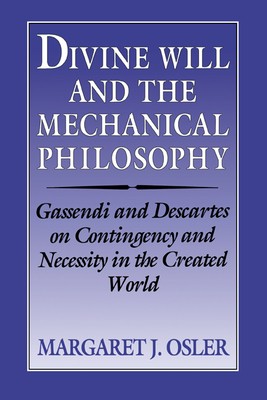
- We will send in 10–14 business days.
- Author: Margaret J Osler
- Publisher: Cambridge University Press
- ISBN-10: 052152492X
- ISBN-13: 9780521524926
- Format: 15.2 x 22.9 x 1.7 cm, softcover
- Language: English
- SAVE -10% with code: EXTRA
Reviews
Description
The difference between Pierre Gassendi's (1592-1655) and René Descartes' (1596-1650) versions of the mechanical philosophy directly reflected the differences in their theological presuppositions. Gassendi described a world utterly contingent on divine will and expressed his conviction that empirical methods are the only way to acquire knowledge about the natural world. Descartes, on the contrary, described a world in which God had embedded necessary relations, some of which enable us to have a priori knowledge of substantial parts of the natural world. In this book, Professor Osler explores theological conceptions of contingency and necessity in the world and how these ideas influenced the development of the mechanical philosophy in the seventeenth century. She examines the transformation of medieval ideas about God's relationship to the Creation into seventeenth-century ideas about matter and method as embodied in early articulations of the mechanical philosophy. Refracted through the prism of the mechanical philosophy, these theological conceptualizations of contingency and necessity in the world were mirrored in different styles of science that emerged in the second half of the seventeenth century.
EXTRA 10 % discount with code: EXTRA
The promotion ends in 15d.09:52:37
The discount code is valid when purchasing from 10 €. Discounts do not stack.
- Author: Margaret J Osler
- Publisher: Cambridge University Press
- ISBN-10: 052152492X
- ISBN-13: 9780521524926
- Format: 15.2 x 22.9 x 1.7 cm, softcover
- Language: English English
The difference between Pierre Gassendi's (1592-1655) and René Descartes' (1596-1650) versions of the mechanical philosophy directly reflected the differences in their theological presuppositions. Gassendi described a world utterly contingent on divine will and expressed his conviction that empirical methods are the only way to acquire knowledge about the natural world. Descartes, on the contrary, described a world in which God had embedded necessary relations, some of which enable us to have a priori knowledge of substantial parts of the natural world. In this book, Professor Osler explores theological conceptions of contingency and necessity in the world and how these ideas influenced the development of the mechanical philosophy in the seventeenth century. She examines the transformation of medieval ideas about God's relationship to the Creation into seventeenth-century ideas about matter and method as embodied in early articulations of the mechanical philosophy. Refracted through the prism of the mechanical philosophy, these theological conceptualizations of contingency and necessity in the world were mirrored in different styles of science that emerged in the second half of the seventeenth century.


Reviews